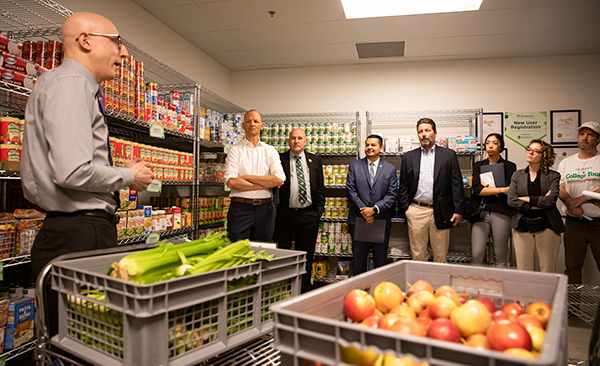 Assemblyman Kevin McCarty, second from left, speaks with President Robert S. Nelsen (third from left) and others during a legislative tour of the University's basic needs facilities on Monday, April 29, 2019. (Sacramento State/Jessica Vernone) | More photos
Assemblyman Kevin McCarty, second from left, speaks with President Robert S. Nelsen (third from left) and others during a legislative tour of the University's basic needs facilities on Monday, April 29, 2019. (Sacramento State/Jessica Vernone) | More photosThe state Senate's Select Committee on Student Success kicked off its 2019-20 college tour at Sacramento State on Monday, April 29, the first stop on a fact-finding mission to understand how California colleges and universities are meeting students’ basic needs.
Committee members who visited campus were Sen. Steve Glazer, Sen. Richard Pan, and Sen. Ben Allen, along with Assemblyman Kevin McCarty, who chairs the Assembly budget subcommittee on education finance.
- Sac State aims to reverse declining graduation rate
- From jail time to future graduate; how education can change a life
The legislators toured the new CARES Office and Associated Students Inc. (ASI) Food Pantry in the University Union, and the Student Health Center at The WELL. They also attended a briefing about Sac State's efforts to improve its four-year graduation rate, and visited the Basic Needs Fair in Serna Plaza, where students learned about campus and community resources.
During a hearing in the University Union Ballroom, several students shared personal stories about daily challenges that, without the basic needs services on campus, might cause them to leave school. They talked about anxiety, depression, rising rents, homelessness, emergency expenses, issues with financial aid – one student said it is “50 years out of date” – and sometimes having to choose between buying groceries and paying rent. Some are from families who also are struggling and can't provide adequate financial support.
The students praised Sac State’s programs, such as CARES, the Food Pantry, emergency housing, and emergency grants, services that have allowed them to continue with their studies and work toward graduation.
“The students’ stories come from a place of lived experience,” said Noel Mora, ASI president. “We know that about 10 percent of students in the California State University (CSU) don’t know where they will sleep on any given night. We know that about 47 percent of students at Sac State experience anxiety over whether they will have a full meal, or any meal, at the end of the day.”
Hunger, housing insecurity, and lack of access to mental health counseling and services are the most significant barriers to students’ academic success, according to campus surveys by various California colleges and universities.
However, little comprehensive data exists, so the State Senate College Tour was launched for lawmakers to visit several CSU, University of California, and community college campuses over the next two years. The goal is for legislators to better understand the difficulties students face and to evaluate basic needs services at each campus.
At Sac State, the legislators heard about the improving four-year graduation rate, which was boosted with state funding that allowed for 1,000 additional classes and 177 new faculty.
“When you hired me, we opened up the hood of the car, and we showed everybody what was inside, and that was an 8 percent graduation rate," said President Robert S. Nelsen. "I’m proud to say we are currently at 14.7 percent and, just making that small change, saved our students $93 million that they would have had to pay in tuition.
“We’re moving the needle forward. We’re trying to provide as many services as we can for our students. We care about the students. We care about them being successful.”
The Student Health Center at The WELL screens students for anxiety and depression. Also established there are urgent-care services allowing students in crisis to be seen immediately by a counselor. A new screening process identifies students who might have food insecurity and refers them to the case manager in the CARES Office.
“We have to continually look for ways to change our service delivery to students and expand the number of programs we have,” said Joy Stewart-James, associate vice president for Student Health Services.
The ASI Food Pantry, recently relocated from Yosemite Hall closet to spacious new quarters in the University Union, will this year serve a record 10,000 people, both Sac State students and the family members they support.
“Accessing resources like the ASI Food Pantry are not only helpful but critical to student success, retention, and graduation,” Mora said.
He noted what Jody Nelsen, wife of the president, said earlier at a ribbon cutting for the expanded pantry: "This is bittersweet, as it’s good to see students are being supported, but it should also not be the scenario we are stuck with in perpetuity.” – Dixie Reid
